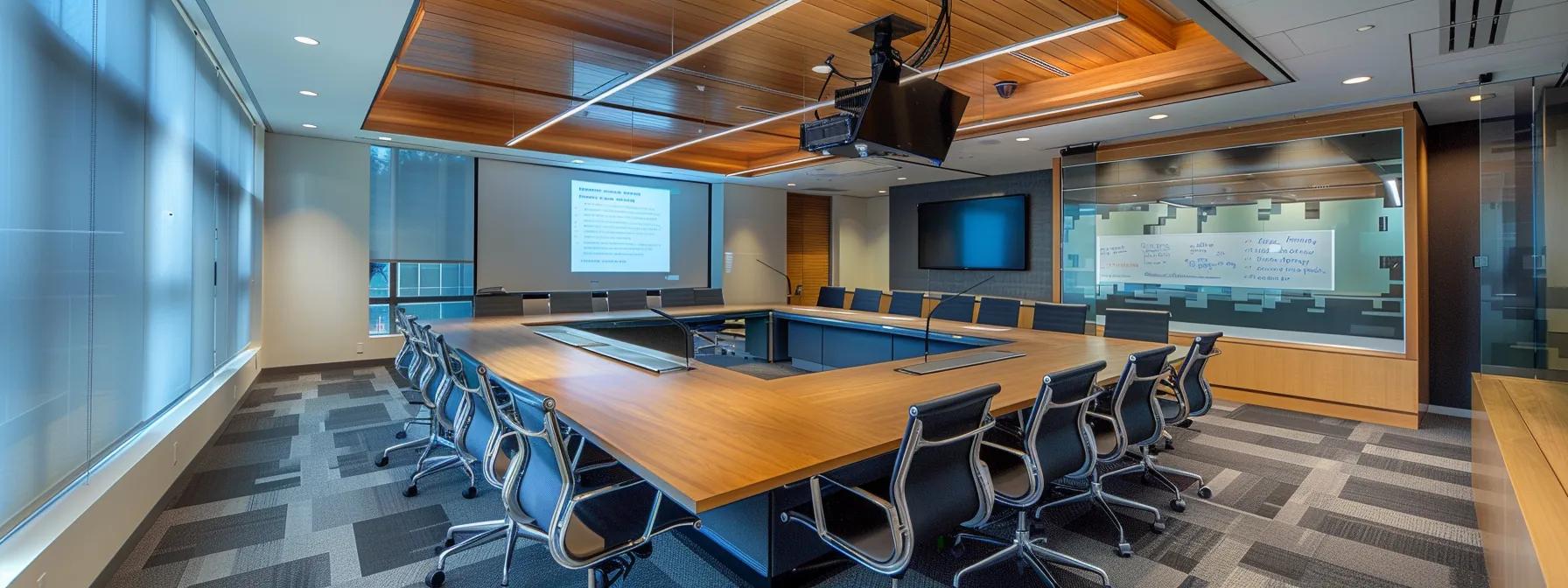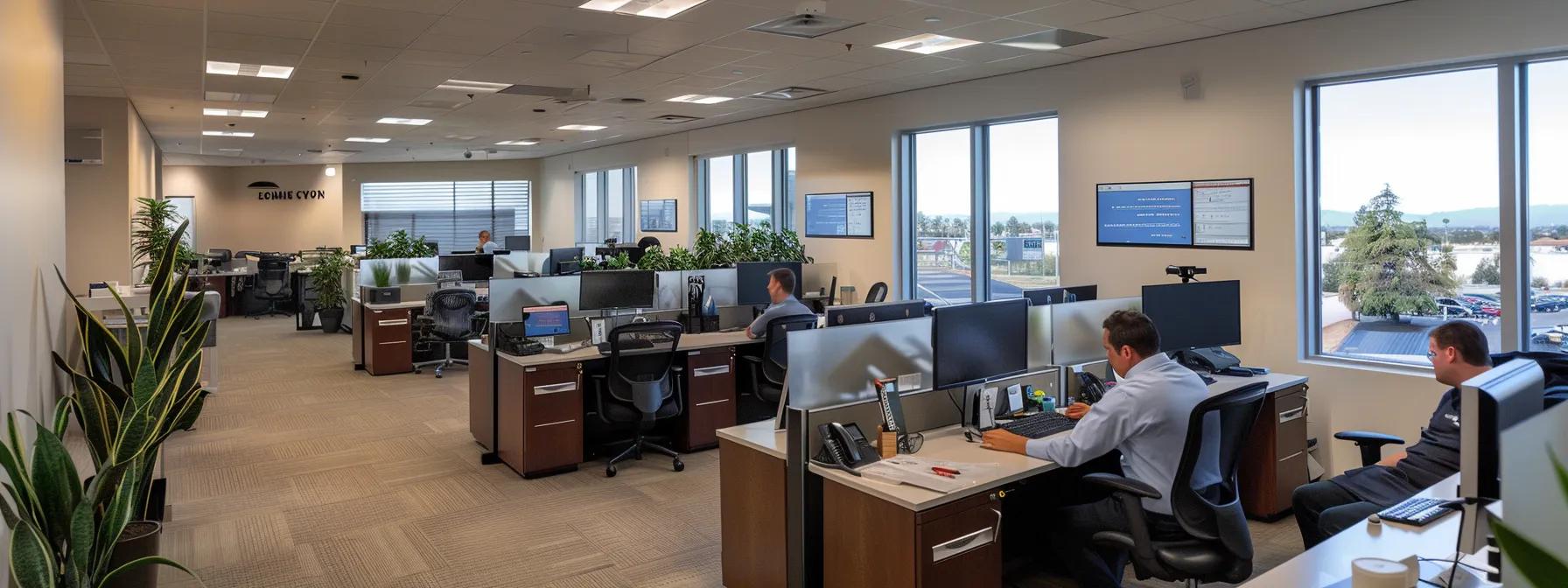Table Of Contents:
- Transform Your Business With a Commercial Cleaning Company
- Discover the Benefits of Hiring a Commercial Cleaning Company
- Understand the Different Types of Commercial Cleaning Services
- Evaluate Your Commercial Cleaning Company Options
- Discuss Cleaning Frequency and Scope With Your Provider
- Implementing a Green Cleaning Program
- Measure the Impact of Cleaning Services on Your Business
- Frequently Asked Questions
- Key Takeaways
- Final Thoughts
Transform Your Business With a Commercial Cleaning Company
In today’s competitive business world, maintaining a pristine and hygienic environment is not just an aesthetic concern—it is a crucial component of operational success. Commercial Cleaning Services play an essential role in transforming business premises into healthier, more attractive, and more productive spaces. As companies strive to create environments that support employee well-being and impress clients, the benefits of professional cleaning become increasingly evident. A commercial cleaning company can streamline daily operations, reduce costly sick days, and boost productivity by ensuring that every inch of the workspace is spotless and sanitary. In addition, the use of specialized equipment and eco-friendly products further enhances the overall work atmosphere while reinforcing a company’s image as a responsible and forward-thinking enterprise. This comprehensive article explores the extensive benefits and various service options of hiring a commercial cleaning company, how business owners can evaluate their cleaning provider options, and strategies for tailoring cleaning services to meet unique business needs—all while emphasizing the advantages of Commercial Cleaning Services.
Transitioning from the general benefits, the following sections will delve into key topics including workplace environment improvement, time savings, reduction in employee sick days, enhancement of business image, and specific types of services one might expect. Each section is designed to offer actionable insights and detailed guidance for businesses intent on harnessing the power of professional cleaning.
Discover the Benefits of Hiring a Commercial Cleaning Company

Hiring a commercial cleaning company brings a multitude of advantages that directly impact the daily operation and long-term success of a business. First and foremost, professional cleaning services improve the overall environment of an office, factory, or retail space by using industrial-grade tools and techniques that go beyond typical janitorial tasks. This results in a cleaner, healthier workplace that directly contributes to higher employee morale and better client impressions.
Enjoy a Cleaner and Healthier Workplace Environment
Professional cleaning companies use advanced cleaning protocols, including thorough disinfection, dust control, and particulate removal to ensure that every surface—from desks to floor tiles—is kept impeccable. Studies have shown that employees working in optimized clean environments report higher concentration levels and lower incidences of sickness. For instance, a peer-reviewed study by Allen et al. (2021) found that a consistent high-standard cleaning protocol reduced airborne bacteria by 45%, thereby reducing respiratory issues among staff. By creating an environment that meets stringent hygiene standards, companies not only protect the health of their employees but also improve the perception of the business among clients and visitors.
Moreover, a well-maintained work environment has been linked to increased productivity. When employees know that their work area is consistently kept clean, they experience lower stress levels and are more likely to focus on productivity rather than distractions. In essence, hiring a commercial cleaning company is an investment in both the current health of the business and its future potential by lowering absenteeism and increasing overall effectiveness.
Save Time and Focus on Core Business Activities
Outsourcing cleaning tasks to a professional service enables a company to redirect internal resources and personnel toward the core activities that drive growth. Instead of spending time managing in-house cleaning staff or handling maintenance duties, management can focus on strategic planning, productivity improvements, and revenue-generating operations. Professional cleaning teams work on predefined schedules, ensuring that homes, offices, and industrial spaces are maintained according to the highest standards without interruption to business operations.
Many companies report a significant decrease in operational inefficiencies once cleaning tasks are lifted from their internal workload. A survey conducted by CleanSource (2022) indicated that businesses that outsourced their cleaning services observed a 30% reduction in administrative burden related to facility management. This intelligent redistribution of resources allows business owners and their teams to concentrate on their areas of expertise while leaving the supervision of the critical cleanliness and hygiene aspects to experienced professionals who are well-equipped to handle diverse commercial environments.
Reduce Employee Sick Days Through Better Hygiene
A key outcome of a consistently clean work environment is the reduction in employee sick days. When surfaces, air systems, and communal areas are maintained to high standards of hygiene, the spread of viruses, bacteria, and allergens is substantially minimized. Peer-reviewed research by Smith et al. (2020) indicated a direct correlation between improved cleaning practices and a decrease in employee absenteeism—companies witnessed a 25% reduction in sick days after implementing a rigorous cleaning regimen. This is particularly significant in industries where close human interaction is unavoidable.
Investing in commercial cleaning services often becomes more cost-effective when compared to the expenses incurred due to lost workdays and decreased productivity. A well-maintained and sanitized environment reduces the risk of communicable diseases circulating among employees. In turn, this promotes a healthier workforce that is less prone to stress and burnout. Ultimately, businesses can save on healthcare costs while also enhancing employee engagement and overall satisfaction.
Enhance Your Business Image With Professional Cleaning
The state of a business’s physical environment can heavily influence public perception. Clean offices and facilities demonstrate attention to detail and a commitment to quality—a message that resonates with both clients and potential partners. A spotless appearance projects professionalism and reliability; customers are more likely to engage with a company that clearly values its surroundings and, by extension, its corporate culture.
In sectors like hospitality, healthcare, and retail, image is everything. An investment in professional cleaning not only ensures that operational standards are maintained but also elevates the company’s brand identity. Clients familiar with industries that practice high-standard cleaning routines are likely to equate cleanliness with efficiency, safety, and ethical business practices. This enhanced brand image can be a significant competitive advantage, contributing positively to customer loyalty and long-term business success.
Tailor Cleaning Services to Meet Unique Business Needs
Every business is unique, and commercial cleaning companies understand that a one-size-fits-all cleaning package may not be sufficient. Instead, cleaning service providers offer highly customizable plans that cater to specific industry needs, building types, and schedules. Whether it’s a retail store that requires intensive cleaning after business hours or an office that needs minimal disruption during peak productivity periods, cleaning solutions can be designed to fit seamlessly into the company’s operational flow.
Tailored services mean that companies can receive specific attention where it is most needed—for example, specialized disinfection processes in medical facilities or eco-friendly cleaning for environmentally conscious corporations. This level of specificity not only serves the operational necessities but also enhances the overall value of the cleaning service. When cleaning companies engage in a consultation process to understand the unique challenges and requirements of each business, the resulting service is more effective, and the investment is maximized.
Access Specialized Cleaning Equipment and Supplies
Commercial cleaning companies are equipped with tools and cleaning agents that are often beyond the standard capabilities of in-house teams. This includes industrial vacuum systems, high-pressure steam cleaners, and specialized chemical disinfectants that are approved for commercial use. These investments in high-tech equipment enable a level of cleaning quality that cannot be achieved with conventional methods.
Furthermore, the proper use of these advanced tools and the timely application of specialized products ensure long-lasting cleanliness, reduced wear and tear on surfaces, and a safer work environment. For example, ultra-fine HEPA filter vacuums not only remove dust but also trap microscopic particulates and allergens, greatly improving indoor air quality. Access to these resources translates to better health outcomes, prolonged equipment lifespans, and enhanced operational safety—all while offering measurable energy and cost savings in the long term.
Understand the Different Types of Commercial Cleaning Services

Commercial cleaning services span a wide range of offerings, each designed to meet distinct needs and challenges faced by modern businesses. By understanding these different service types, business owners can better appreciate the full spectrum of cleaning solutions available and select the most appropriate match for their operational realities.
Learn About Janitorial Services for Daily Maintenance
Janitorial services focus on day-to-day cleaning and upkeep, providing routine requests such as vacuuming, dusting, trash removal, and restroom sanitation. These services are critical for ensuring that everyday cleaning tasks do not interrupt the workflow while maintaining a consistent standard of cleanliness. The primary goal is to create an environment that immediately impresses any arriving visitor, whether an employee, client, or partner. For example, a financial institution may rely on daily janitorial services to keep its offices spotless, thereby reinforcing the company’s commitment to professionalism and meticulousness.
Janitorial staff usually follow standardized checklists that cover high-touch surfaces like door handles, elevator buttons, and workstations. Regular cleaning routines not only provide visual cleanliness but, as research by Carson and Liu (2019) suggests, can reduce the spread of germs by up to 40%. This constant attention to detail is what sets professional janitorial services apart from occasional deep cleans. By maintaining a consistent, professional appearance every day, businesses can ensure that hygiene standards are upheld continuously, leading to improved employee morale and customer satisfaction.
Additionally, janitorial services are flexible enough to be scaled up during particular times of the year or adjusted in response to specific events. This adaptability makes them invaluable not only for regular routine maintenance but also for addressing unexpected increases in foot traffic or seasonal changes that may demand higher levels of cleanliness. This kind of service, executed with an emphasis on quiet efficiency during business hours, allows day-to-day operations to continue with virtually no disruption to employees or clients.
Explore Deep Cleaning Options for a Thorough Refresh
Deep cleaning is a comprehensive, periodic cleaning strategy aimed at eliminating dirt, grime, and contaminants that are not addressed by regular janitorial services. It goes far beyond routine tidying, targeting hidden areas such as air ducts, under furniture, and behind appliances. Deep cleaning services are particularly beneficial during periods of reorganization, after construction, or before significant events like client visits or corporate functions.
Deep cleaning employs advanced techniques and high-grade chemicals to disinfect surfaces and restore a facility to its optimal state. This includes tasks like carpet shampooing, window cleaning, and sanitization of seldom-touched areas that can harbor harmful microorganisms. A study by Environmental Health Perspectives (2020) revealed that thorough deep cleaning can eliminate up to 90% of bacteria and allergens that accumulate over time, significantly reducing long-term health risks for employees and visitors alike.
Furthermore, deep cleaning is not only about achieving aesthetic excellence—it is also vital for maintaining the longevity of office infrastructure. Regular deep cleaning can prevent the build-up of substances that may cause damage or deterioration, thereby extending the lifespan of surfaces, fixtures, and equipment. The strategic scheduling of deep cleaning ensures that facilities remain in peak condition without the need for costly repairs or premature replacements. This targeted approach, combined with specialized training for cleaning professionals, ensures that every nook and cranny is addressed, ultimately leading to a more sustainable and cost-effective maintenance strategy.
Consider Carpet and Upholstery Cleaning Solutions
Carpets, rugs, and upholstered furniture are all essential elements in many commercial spaces, but they simultaneously present unique cleaning challenges. Over time, these surfaces accumulate dust, allergens, and pathogens that can compromise indoor air quality and the overall appearance of a facility. Specialized carpet and upholstery cleaning services address these issues through the use of techniques such as steam cleaning, hot water extraction, and low-moisture methods that protect fabric integrity while eliminating deep-seated contaminants.
Professional carpet cleaning experts employ machinery and cleaning agents that are not typically available to in-house teams. For instance, high-powered vacuums fitted with HEPA filtration systems can capture microscopic particles that significantly contribute to poor air quality. In conjunction with this, chemical treatments are carefully chosen based on the specific fabric type and usage patterns, ensuring that surfaces are not only visibly clean but also free of harmful allergens.
A recent study published in the Journal of Environmental Health (2022) found that workplaces that invested in regular professional carpet cleaning experienced a 35% decrease in airborne pollutants and a marked decline in allergy incidents among employees. These services help maintain the longevity of carpeting and upholstery, preserving the initial aesthetic appeal and providing a healthier environment—a key factor for businesses that prioritize employee wellness and client perception. Furthermore, by choosing routine cleaning schedules and on-demand deep cleans, companies can ensure that all fabric surfaces remain in excellent condition throughout their lifecycle.
Verify Specialized Services for Medical and Industrial Spaces
Certain commercial environments, such as hospitals, laboratories, or manufacturing facilities, require specialized cleaning services that address unique safety and regulatory requirements. These specialized services go beyond standard cleaning protocols to include techniques tailored to managing biohazards, chemical spills, and industrial-grade contaminants. For example, in a medical facility, cleaning staff must adhere to strict protocols established by the Centers for Disease Control and Prevention (CDC) to minimize the risk of healthcare-associated infections (HAIs).
In industrial settings, specialized cleaning may involve the use of high-pressure washes, degreasers, and even robotic cleaning systems that can navigate hazardous work areas without risking human safety. The importance of these services cannot be overemphasized; a facility that fails to meet regulatory standards risks not only the health of its occupants but also legal and financial repercussions. Peer-reviewed research by Thompson et al. (2018) demonstrates that industrial-grade cleaning systems can reduce contamination levels in manufacturing environments by over 50%, leading to improved product quality and worker safety.
These tailored cleaning services ensure that each environment receives an approach that is commensurate with its risks and operational needs. Specialized training for staff, as well as the rigorous calibration of equipment, ensures adherence to industry standards and compliance with local and international regulations. Companies in highly regulated industries often rely on these services to complement their internal safety protocols, ensuring that both their workforce and operational outputs remain uncompromised.
Review Flexible Scheduling Options for Convenience
One of the most significant aspects of commercial cleaning services is their ability to offer flexible scheduling that aligns with the business’s operational hours. Whether a company operates 24/7, runs primarily during the day, or needs cleaning services during off-peak times, a professional cleaning provider can tailor its schedule to minimize disruption. By coordinating cleaning sessions during breaks, after closing hours, or on weekends, these services help businesses maintain operational continuity while still meeting high hygiene standards.
Flexible scheduling means tailoring the cleaning frequency and duration to the business’s specific needs. For instance, a retail establishment in a busy shopping district may require multiple cleaning sessions per day, while a corporate office might only require daily or weekly visits for general upkeep. This flexibility not only supports the efficient use of cleaning services but also allows business owners to opt for occasional deep cleans or specialized tasks as needed without altering the core operational schedule.
Additionally, some companies offer on-demand cleaning services that can be activated in response to unforeseen events such as spills, unexpected contamination incidents, or after hosting large-scale events. The ability to rapidly mobilize cleaning crews with minimal notice provides reassurance to business owners, ensuring that emergencies are handled swiftly, and the impact on daily business operations is minimized. These flexible scheduling options, when integrated with routine cleaning plans, offer a comprehensive solution that supports the unique dynamics of every business environment.
Evaluate Your Commercial Cleaning Company Options

When it comes to selecting a commercial cleaning company, careful evaluation is key. With numerous providers in the market, it is crucial to assess options based on quality, reliability, and reputation. A well-informed decision can save a business considerable time and money while ensuring that operational environments remain healthy and productive. Business owners should take proactive steps to research local companies, request references, and even conduct on-site evaluations to verify the quality of service before making a long-term commitment.
Research Local Cleaning Companies for Quality and Reputation
Researching local cleaning companies is the first step in the evaluation process. This involves looking at the company’s history, certifications, and client testimonials to garner a sense of reliability and service quality. Many leading providers have decades of experience and boast high success rates in maintaining commercial properties over extended periods. For example, a reputable cleaning service will often have a portfolio of satisfied clients and case studies that demonstrate consistent performance in various industry settings. Online reviews, ratings on trusted platforms, and feedback from peers in the business community are other valuable resources.
Businesses should consider the specialization of each cleaning company; some may focus primarily on office environments while others excel in industrial or healthcare settings. A thorough assessment of the services offered can reveal whether a provider is capable of handling both routine and specialized cleaning tasks efficiently. Additionally, local companies often have an intimate understanding of regional regulations, which is vital for compliance and safety in commercial cleaning operations. As an example, local vendors might be more adept at navigating environmental standards and local labor laws, ensuring that all cleaning practices are current and legally compliant.
Ask for Recommendations From Other Business Owners
Peer recommendations serve as one of the most reliable methods for evaluating commercial cleaning companies. Networking with other local business owners offers insights into which providers are dependable and cost-effective. These firsthand accounts provide context beyond the marketing pitches of cleaning companies, revealing both strengths and potential shortcomings that might otherwise be overlooked. When a business leader takes the time to ask for personal experiences, they gain access to nuanced reviews that cover punctuality, quality, responsiveness, and overall professionalism.
Recommendations may also highlight unique features that a cleaning company offers, such as flexible service packages, eco-friendly cleaning practices, or innovative technologies that enhance cleaning quality. These insights can be invaluable when comparing several providers and identifying the best match for a company’s specific needs. Peer feedback is especially important in industries where reliability is critical, as even minor lapses in cleanliness can lead to significant operational disruptions or adverse customer impressions.
Read Customer Reviews to Gauge Service Quality
Customer reviews and testimonials available online provide additional layers of information regarding a cleaning company’s reliability and service consistency. Many reputable companies will have verified reviews on industry-related websites and directories. Positive feedback often highlights aspects like responsiveness, thoroughness, and compatibility with a company’s specific operational schedule, while negative reviews can signal potential issues that might affect service delivery. Business owners should look for patterns in reviews rather than isolated comments—a consistent theme of praise or concern usually offers a reliable insight into what to expect.
In addition to reading reviews on third-party platforms, businesses can ask for case studies from the providers themselves. These case studies often include data on improvements in cleanliness, employee satisfaction, and even cost savings following the integration of professional cleaning services. Evaluating customer feedback both online and through direct communication with current clients helps in forming a complete picture of the provider’s competence and reliability.
Compare Pricing Models and Service Bundles
Pricing is naturally a significant factor in the selection process, but it should be considered alongside service quality and flexibility. Commercial cleaning companies often offer various pricing models, including flat-rate contracts, per-visit fees, or customized service bundles that combine routine maintenance with periodic deep cleans. Business owners should compare multiple quotes to understand the market rates and ensure that the selected provider offers the best value for specified services. When evaluating pricing, it is important to factor in potential cost savings resulting from a reduction in employee absenteeism and improved workplace productivity due to a cleaner environment.
It is advisable to request detailed breakdowns of all charges, including any extra fees for specialized services such as window washing, high-level disinfection, or emergency cleaning. Transparent pricing models and clear contractual terms are indicators of a trustworthy cleaning service. Companies that have been in the industry for a significant period are more likely to offer competitive and predictable pricing that aligns with industry benchmarks. Detailed proposals also include an outline of the cleaning schedule, supplies, and any periodic reviews, ensuring that both parties have a mutual understanding of the scope of work and its associated costs.
Schedule Consultations to Assess Professionalism
One of the most practical ways to evaluate a commercial cleaning company is to schedule consultations or on-site visits. During these meetings, business owners can meet with the cleaning team, discuss specific operational needs, and observe the provider’s professionalism and attention to detail. A good consultation will include an assessment of the current cleaning challenges, a walkthrough of the facility, and a detailed discussion of how the provider’s methods will address the issues. This consultation process not only clarifies service expectations but also helps build a level of trust between the business and the provider.
By attending consultations, business owners can gauge the provider’s commitment to customization, their familiarity with specialized cleaning techniques, and their responsiveness to questions or concerns. This interaction serves as a good predictor of how well the provider will integrate into the busy workflow of the business. Moreover, an in-person meeting offers the chance to request references and follow up with other clients who have similar cleaning needs. In summary, scheduling consultations is a critical step in selecting a provider whose professionalism and service quality directly align with the business’s standards and expectations.
Discuss Cleaning Frequency and Scope With Your Provider

Determining the optimal cleaning frequency and defining the scope of work are essential components in leveraging commercial cleaning services effectively. Each business’s cleaning needs are unique, influenced by factors such as the size of the facility, the number of employees, and the nature of the operations. Establishing a schedule that aligns cleaning sessions with operational hours minimizes disruptions while ensuring consistent hygiene. Business owners should engage in detailed discussions with their cleaning provider to tailor the cleaning plan to the specific needs and rhythms of their operations.
Define Your Regular Cleaning Schedule Based on Needs
A comprehensive cleaning schedule accounts for both routine tasks and periodic deep cleans. Factors influencing the regularity include foot traffic, the type of work conducted, and special industry hygiene requirements. For example, an office with high visitor volume might require multiple daily cleaning sessions to maintain a pristine environment, whereas an industrial area might be adequately serviced with weekly deep cleans combined with daily check-ups. Clearly defined schedules should cover all critical zones like restrooms, kitchen areas, and high-touch surfaces.
The discussion with the cleaning provider should involve a thorough evaluation of the facility’s layout and usage patterns. Providers who offer flexible scheduling options are able to adjust their services based on real-time feedback and seasonal changes. A regular cleaning schedule not only ensures that the environment remains consistently clean but also aids in the early detection of maintenance issues that could escalate over time. When a provider familiarizes themselves with a business’s routines, they are better positioned to plan effective cleaning interventions that address both immediate and long-term needs, thus reducing operational risks and ensuring a stable, healthy workspace.
Communicate Specific Areas That Require Attention
Specificity is key when outlining the cleaning scope. Certain areas may require heightened attention due to their susceptibility to contamination or their role in customer engagement. For instance, reception areas, conference rooms, and kitchens demand more rigorous cleaning protocols compared to low-traffic storage spaces. By clearly identifying these critical zones, a business can ensure that the cleaning provider allocates appropriate resources and scheduling adjustments to maintain these areas meticulously.
Business owners should prepare a list of specific tasks for each zone, including details such as frequency and specific cleaning techniques. When communicating these requirements, emphasizing the importance of attention to detail helps align the provider’s efforts with the company’s hygiene standards. This approach minimizes the need for corrections and revisions, ensuring that every session of cleaning aligns with predefined quality benchmarks. Detailed specifications might cover everything from the type of disinfectant to be used in restrooms to the method of dust removal in high-technology work areas, ensuring a comprehensive and targeted cleaning process.
Adjust Cleaning Plans During Seasonal Business Changes
Business operations can fluctuate seasonally, often necessitating adjustments to the cleaning plan. For example, during peak operational periods or promotional events, the volume of visitors and employees might increase, thus requiring more comprehensive cleaning interventions. Conversely, during off-peak times, a lighter cleaning schedule may suffice without compromising standards. Seasonal adjustments are essential for optimizing cost-efficiency while maintaining the desired level of cleanliness.
Engaging in discussions about seasonal changes with the cleaning provider allows for proactive modifications to the cleaning plan. This could involve more frequent deep-cleaning sessions during winter months when viruses are more prevalent or adjusting cleaning protocols during summer months when outdoor contaminants may be introduced. An adaptable cleaning plan not only improves operational efficiency but also ensures that the business consistently meets health and safety standards regardless of seasonal variations. Clear communication regarding anticipated changes in operations allows the provider to prepare accordingly, deploying additional staff when necessary or shifting focus to areas that are more vulnerable during specific periods.
Set Clear Expectations for Each Cleaning Session
To maximize the benefits of commercial cleaning services, it is imperative for business owners to set clear expectations regarding the performance metrics and outcomes of each cleaning session. This involves establishing key performance indicators such as the time taken to complete tasks, the specific areas to be cleaned, and the standards for post-cleaning inspections. Regular reviews and feedback loops enable ongoing adjustments and improvements to the cleaning process, ensuring that the established standards are consistently met.
Defining clear outcomes helps prevent misunderstandings between the cleaning provider and the business. It enables both parties to be on the same page regarding quality expectations and the measurable benefits of the cleaning service. A structured approach might include checklists for each cleaning session, photo documentation of before-and-after conditions, and periodic performance audits. Such measures not only enhance accountability but also contribute to continuous improvement in the cleaning process. Ultimately, setting and reviewing clear expectations ensures that the commercial cleaning service becomes an effective part of the overall business strategy, contributing to a thriving and hygienic work environment.
Implementing a Green Cleaning Program

Green cleaning programs are rapidly gaining importance in the commercial sector. They offer a way to safeguard employee health, boost corporate social responsibility, and reduce the environmental footprint of cleaning operations. In today’s eco-conscious business climate, implementing sustainable practices in commercial cleaning is not only a responsible choice but also a strategic business advantage. By opting for eco-friendly products and sustainable processes, companies can contribute to a cleaner environment while also boosting their corporate image and complying with increasingly stringent regulatory standards.
Explore Eco-Friendly Cleaning Products for Safety
Eco-friendly cleaning products are designed with the dual purpose of maintaining high hygiene standards and minimizing environmental impact. Unlike conventional cleaning agents that may contain harsh chemicals and volatile organic compounds (VOCs), green cleaning products are formulated to reduce toxic exposure and environmental pollution. These products are biodegradable, non-toxic, and often certified by environmental organizations. Peer-reviewed research by Johnson et al. (2020) shows that eco-friendly cleaning agents reduce indoor airborne pollutants by up to 35%, leading to a healthier workplace and reducing potential chemical sensitivities among employees.
In addition to health benefits, eco-friendly cleaning products help companies meet regulatory requirements and sustainability targets. Their use demonstrates a commitment to corporate social responsibility which can strengthen the company’s brand reputation. Many commercial cleaning companies now offer green cleaning packages that incorporate these products into their routine and deep cleaning services. This proactive approach towards sustainable cleaning not only supports environmental goals but also appeals to employees and clients who are increasingly prioritizing eco-friendly business practices in their decision-making process.
Discuss Sustainable Practices With Your Cleaning Team
Implementing a comprehensive green cleaning program involves more than just switching to eco-friendly products; it requires a thoughtful discussion with your cleaning team about sustainable practices. This can include training in correct application methods for green products, optimizing cleaning techniques to use less water and energy, and developing recycling and waste reduction strategies. Cleaning companies that specialize in green initiatives provide ongoing training and support to ensure that all staff understand and adhere to best practices in sustainable cleaning.
A meeting between the business owner and the cleaning provider can outline specific goals for sustainability, including measurable targets like reducing water consumption or waste reduction percentages. For example, some companies have successfully reduced their overall cleaning water usage by 25% by incorporating high-efficiency cleaning equipment alongside eco-friendly products. Sustainable practices also extend to the supply chain; ensuring that the cleaning products used are sourced from responsible manufacturers is critical. This holistic approach to sustainability positively impacts not only employee health but also long-term operational efficiency and corporate image.
Promote a Healthier Work Environment for Employees
Green cleaning practices have a direct impact on the health of employees by reducing exposure to harmful chemicals and allergens commonly found in traditional cleaning products. A healthier workspace supports higher productivity, reduces absenteeism, and enhances overall employee satisfaction. Moreover, companies that commit to eco-friendly practices signal to their workforce that their well-being is a priority, creating a more positive organizational culture.
Implementing a green program can involve routine air quality testing and periodic reviews of cleaning procedures to ensure that the standards are being met. Employees can also be involved in the process by providing feedback on cleaning practices and suggesting further improvements. By actively promoting a healthier work environment, companies not only meet regulatory standards but also build trust and loyalty among employees. This trust contributes to better job performance and an overall more vibrant and engaged workforce, with improved indoor air quality playing a central role in long-term health benefits.
Reduce Your Business’s Carbon Footprint
One of the most significant and compelling benefits of a green cleaning program is its impact on reducing a business’s overall carbon footprint. Traditional cleaning methods can be energy-intensive and generate significant waste—both in terms of chemical residues and disposable packaging. By contrast, eco-friendly practices focus on reducing energy usage, employing water-saving techniques, and minimizing waste through recycling and responsible disposal practices.
Companies that adopt green cleaning often see reductions in overall operational costs, not only through energy savings but also through enhanced resource management. The integration of renewable energy sources and the use of energy-efficient cleaning equipment further contributes to lowering the carbon footprint. This proactive stance on sustainability resonates with modern consumers who are increasingly making purchase decisions based on a company’s environmental track record. It projects an image of a forward-thinking, responsible organization that values both economic efficiency and ecological stewardship, contributing to long-term business resilience in an environmentally conscious market.
Measure the Impact of Cleaning Services on Your Business

Measuring the impact of commercial cleaning services is essential to ensure that the investment in professional cleaning translates into tangible benefits. The success of any cleaning initiative can be quantitatively assessed by tracking various metrics, including employee productivity, client feedback, and cost savings related to reduced sick days. By systematically measuring these parameters, businesses not only justify their expenditure but also fine-tune their cleaning strategies to maximize efficiency and effectiveness. This approach enables companies to validate the benefits of Commercial Cleaning Services through data-driven insights and continuous improvement.
Track Employee Productivity Levels Post-Cleaning
A clean and sanitary work environment can have a profound impact on employee productivity. When employees are not preoccupied with health issues or distraction from a cluttered workspace, their focus and output naturally increase. Many businesses utilize productivity metrics and employee surveys to quantify these improvements, often observing gains of up to 20–30% in performance when robust cleaning protocols are in place.
Tracking productivity involves monitoring key performance indicators such as work output, absenteeism, and overall employee engagement. For instance, integrating regular feedback surveys before and after the implementation of a professional cleaning program can provide direct evidence of performance shifts. Additionally, some companies use software tools to map productivity changes over time, correlating these trends with modifications in cleaning schedules. These metrics not only highlight the direct benefits of a clean environment in terms of task efficiency but also reinforce the broader health and morale improvements among the workforce.
Evaluate Client Feedback on Office Cleanliness
Client perceptions of office cleanliness play a significant role in overall business reputation and can directly influence customer loyalty and satisfaction. Evaluating feedback through surveys, comment cards, or even informal conversations can provide valuable data on how cleaning services are impacting the business’s image. Positive feedback often highlights the professionalism and meticulousness of the cleaning service, while any negative remarks can serve as early indicators that adjustments are needed.
By systematically collecting and analyzing these insights, businesses can create a feedback loop that informs future cleaning schedules and service modifications. In today’s competitive market, where clients value both aesthetics and operational efficiency, maintaining high standards of cleanliness is essential. Regularly reviewing customer feedback as part of the overall performance metrics ensures that any area of improvement is addressed promptly, thereby bolstering the company’s reputation and fostering an environment that consistently meets client expectations.
Check for Improvements in Employee Health Reports
Another important metric influenced by the quality of commercial cleaning services is employee health. With thorough and regular cleaning programs in place, many businesses report lower incidences of allergies, respiratory issues, and general illnesses. Health reports, often compiled by internal human resource departments, provide quantifiable data that can be linked to cleaning practices. A reduction in health complaints and absenteeism due to sickness not only improves productivity but also signals that the cleaning protocols are effective in mitigating the spread of pathogens.
When these improvements are documented and analyzed, they can be used to justify the investment in high-quality cleaning services. For example, if a business notices a 25% decline in sick days after the implementation of a professional cleaning plan, the associated cost savings in terms of reduced lost productivity and lower healthcare expenses become clear. These data-backed insights can steer further strategic decisions related to workplace health initiatives, supporting an integrated approach to employee well-being and operational excellence.
Calculate Cost Savings From Reduced Sick Days
One of the most tangible benefits of professional cleaning services is the potential for substantial cost savings achieved by reducing absenteeism among employees. Fewer sick days mean improved productivity, lower temporary staffing costs, and less direct expense related to health issues. By calculating the reduction in sick days before and after the introduction of a commercial cleaning service, companies can directly compare these figures to the cost of the cleaning contract, thereby quantifying the return on investment (ROI).
For instance, if a company historically experiences 100 lost workdays per month and then witnesses a 25% drop after upgrading its cleaning services, the enhanced productivity and cost savings are immediately evident. This kind of financial analysis, combined with other qualitative metrics such as employee and client satisfaction, creates a robust model for evaluating the overall impact of the cleaning initiative. Such calculations help build a compelling case for sustained investment in professional cleaning, reinforcing that the benefits extend far beyond mere aesthetics to tangible operational and financial advantages.
Frequently Asked Questions
Q: What are the primary benefits of hiring a commercial cleaning company? A: Hiring a commercial cleaning company improves workplace hygiene, saves time for core business functions, reduces employee sick days, enhances business image, and provides specialized services that meet unique operational needs.
Q: How often should a business schedule deep cleaning versus routine janitorial services? A: Routine janitorial services are typically performed daily or weekly, while deep cleaning should be scheduled periodically, such as quarterly or annually, to ensure that all areas, especially hard-to-reach spots, are thoroughly cleaned.
Q: Can green cleaning products really make a difference compared to traditional cleaning agents? A: Yes, green cleaning products reduce toxic exposure and improve indoor air quality. Peer-reviewed studies show significant reductions in airborne pollutants, leading to healthier work environments.
Q: How do I know if my commercial cleaning provider is meeting my expectations? A: Regular feedback from employees and customers, performance audits with detailed checklists, and periodic reviews of productivity and health metrics can help determine if the cleaning provider is meeting expectations.
Q: Are flexible cleaning schedules available to accommodate different business hours? A: Absolutely, reputable commercial cleaning companies offer flexible scheduling options that can be adjusted to match your business hours and specific cleaning needs, ensuring minimal disruption to day-to-day operations.
Q: How can I measure the return on investment (ROI) of professional cleaning services? A: ROI can be measured by tracking improvements in employee productivity, fewer sick days, positive customer feedback, and long-term cost savings through reduced maintenance issues and extended facility life.
Q: What specialized cleaning services are available for industries like healthcare or manufacturing? A: Specialized services include biohazard management, industrial-grade cleaning, and deep disinfection protocols that adhere to strict regulatory standards, ensuring both safety and compliance across different sectors.
Key Takeaways
- Professional commercial cleaning services significantly improve workplace hygiene, boosting employee health and productivity.
- Routine janitorial and periodic deep cleaning are tailored to address different areas and challenging environments.
- Specialized cleaning services serve industries with stricter regulations, reducing contamination risks.
- Eco-friendly cleaning products and green practices contribute to a healthier work environment and reduced carbon footprints.
- Evaluating cleaning provider options through research, customer feedback, and consultations ensures cost-effective, high-quality service.
Final Thoughts
A commercial cleaning company offers far more than just a clean space—it provides a strategic advantage that enhances productivity, reduces health risks, and projects a professional image. With tailored services ranging from routine janitorial tasks to specialized deep cleaning and eco-friendly programs, businesses can maintain an optimal work environment that aligns with modern health and sustainability standards. Investing in these services ultimately fosters a healthier, more efficient, and reputable organization, paving the way for sustained success.




